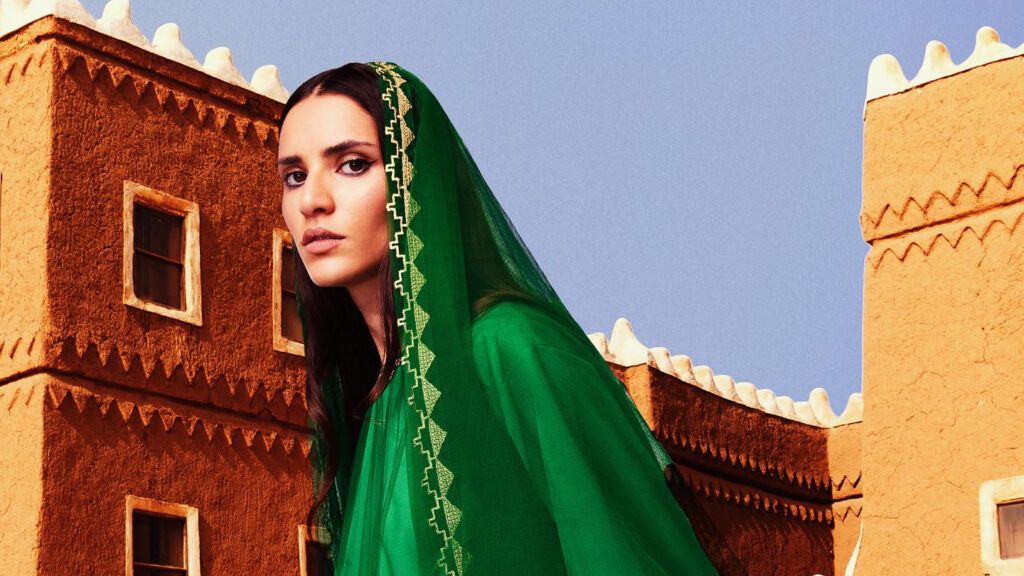After attending star-studded showcases in London, Milan, and Paris, the global fashion community is set to disembark in Riyadh for Saudi Arabia’s first ever fashion week. Celebrities, VIPs, buyers, and industry stakeholders will gather to witness 30 of the kingdom’s top designers take over the runway from October 20 to 23.
Hosted by the Saudi Fashion Commision, Riyadh Fashion Week will commence with a gala dinner attended by 250 opinion leaders and stakeholders. The following days will see a curated lineup of 16 runway shows along with a showroom featuring local brand products, giving audiences and buyers a closer look at what Saudi Arabian creatives have to offer.
“For the first time ever, we are welcoming the global fashion community to the epicenter of Saudi fashion, here in Riyadh,” said Burak Çakmak, CEO of the Saudi Fashion Commission, in a release. “The event will showcase the best of our creative talent, allowing yet another opportunity for our brands to connect with the world.”
Names to watch
The inaugural lineup exclusively spotlights Saudi Arabian designers, who are poised to shake up the fashion scene.
A red carpet favorite, Honayda Serafi has dressed the likes of Priyanka Chopra and Lupito Nyong’o in elegant, powerful statement pieces. Her eponymous luxury fashion house, Honayda, was launched in 2016, and last year became the first female-led Saudi brand to be displayed at Harrods.
As Serafi says, her Spring/Summer 2024 collection “celebrates the braveness of women in space as they conquer the larger universe and praises the achievement of those women who defied gravity, expanding the frontiers of knowledge and perception.” She will show in Riyadh on October 22.
Also presenting on October 22, Shahd AlShehail is another name to watch. Her ethical luxury label, Abadia, combines feminine flare with a masculine structure while preserving the craftsmanship of the Arabian Peninsula. Last month, she kitted out the Saudi team for the opening ceremony of the 2023 Asian Games.
Her upcoming runway show in Riyadh will be an intricate conversation between the past and the future.
“Guests should expect to see draping that evokes timeless glamor and elegance contrasted with clean lines and geometric shapes to keep a modern aesthetic and create a unique visual experience,” she says.
Meanwhile, Fahad Al Jomiah and Khalid Aljammaz are the masterminds behind 1886, the kingdom’s first streetwear brand. Established in 2016, the label targets millennial and Gen Z consumers with trend-conscious, gender-neutral styles. It represents Saudi Arabia’s unique perspective on streetwear.
“[Guests] can anticipate a visually stunning show filled with intricate details, luxurious fabrics, and impeccable craftsmanship,” says Al Jomiah about the 1886’s runway on October 23. “We want to leave our guests inspired and eager to embrace the emerging fashion scene in Saudi Arabia.”
Big fashion week dreams
For many of these designers, showing on home soil is a full-circle moment.
“Years ago, I started a very small business in the kingdom, and here I am today proudly having my first runway fashion show with other Saudi designers,” Serafi says. “It’s an opportunity to express our cultural identity through fashion, to tell our stories, and to redefine the global perception of Saudi style, and a chance to contribute our vision to the broader fashion narrative.”
Under Vision 2030, Saudi Arabia has been working to cultivate its non-oil industries, including fashion. In 2022, the fashion sector contributed $12.5 billion or 1.4 percent to the country’s GDP and employed 230,000 individuals. In the next decade, the kingdom plans to rapidly scale up its manufacturing and logistics capabilities, with growth to be driven in part by designers looking to establish local production capabilities.
“What’s exciting is that the scale of the opportunity that exists for the domestic fashion industry in Saudi Arabia cannot be understated,” Çakmak tells Jing Daily. “As it matures, we anticipate that the whole fashion value chain will contribute to the realization of the ambitious goals under Vision 2030, supporting the diversification of the kingdom’s economy.”
“The scale of the opportunity that exists for the domestic fashion industry in Saudi Arabia cannot be understated.”
The establishment of the Saudi Fashion Commission and its flagship Saudi 100 Brands program represents a seminal point in the nation’s development as a fashion producer. Through the program, local designers, 85 percent of which are women, have gained access to mentorships and masterclasses along with opportunities to showcase at some of the world’s biggest fashion events, including Paris and Milan fashion weeks.

Saudi 100 Brands returned for its second showcase at Milan Fashion Week last month. Photo: Saudi 100 Brands
“The goal is growing it to sit among the most popular fashion weeks in the world,” Çakmak adds. “Moving forward, the event will be open to international brands to exhibit as they would at other prominent fashion weeks in the world.”
While Paris and Milan attract the biggest names in luxury, and London Fashion Week boasts a reputation for nurturing up-and-coming talent, Riyadh is setting the stage for fashion’s future — one where Arab designers get a much bigger spotlight.

